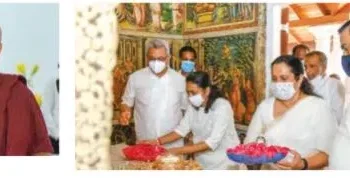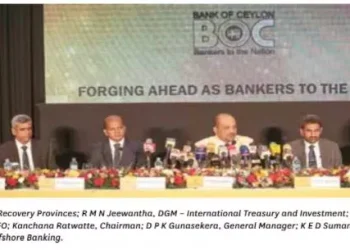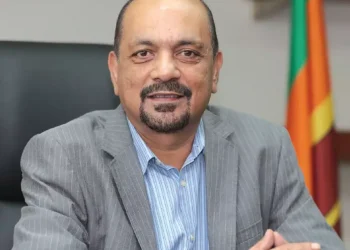Saman Upasena, Chairman, KDU Group, is confident about Sri Lanka. He says the country has many opportunities that would bring prosperity. Born and bred in Ratnapura, Saman Upasena has expanded the tea business his father founded to become Sri Lanka’s largest orthodox black tea manufacturer. Starting from one tea factory, the Group has grown to include eight factories with a fleet of over 250 vehicles that collects tea leaves from more than 20,000 tea smallholders. Furthermore, the Group has expanded under Saman Upasena’s leadership into power generation through mini-hydropower plants. Venturing into the hospitality sector through challenging times with the iconic DoubleTree by Hilton Weerawila Rajawarna Resort, Saman Upasena has shown that with determination much can be achieved. The Resort has seamlessly conserved the environment while providing a luxurious setting. Saman Upasena says that Sri Lanka is a gem and an asset.
By Udeshi Amarasinghe. Photography Menaka Aravinda.
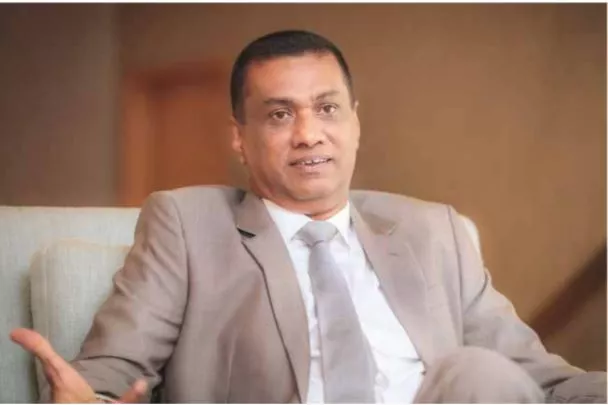
Can you tell us about the story of kDU Group?
My father, the late Mr. K D Upasena was the Founder and Chairman of the Group. He received his education at St Joseph’s College, Bandarawela. My father was a vegetable trader by profession. He was also engaged in gem mining and trading when he found a beautiful cat’s-eye gemstone in the Denavaka river in Pelmadulla. We have seven in the family, including myself. My mother had urged my father to invest in a long-term plan to secure the children’s future. Thus, they decided to purchase a tea factory. The factory was known as the ‘Maha Kade Istoruwa’ and we converted it to Galpadithanne, the largest tea- producing factory in Sri Lanka. My father started with one tea factory, but today we have eight tea factories as a Group, and we are the biggest tea producer in Sri Lanka. My brother, Thushan, and I expanded the company.
I completed my education at St Benedict’s College. After that, I did my management training at Bartleet House. Then I joined with my father and learned the business from him.
As we advanced, we have diversified into hydropower, tea exports and a Sri Lankan brand called ‘Tea Jar’, and hospitality. DoubleTree by Hilton Weerawila Rajawarna Resort is our first initiative in the 5-star hotel category. My initial plan was to manage the property by myself, but later we decided to tie up with the Hilton brand. We knew that a globally recognized brand would serve us better to go forward. The location was ideal in the Hambantota district in the Southern Province. We have a 1.4-megawatt hydropower plant, and I plan to build another five-megawatt hydropower plants very soon.
The Kuttapitiya estate in Pelmadulla is significant, and it has the seventh longest waterfall on the property. The estate belonged to the Siri Pada temple, but it was abandoned, and I was asked to take over. Today, the factory produces more than one million kilos of black tea per annum. But we are looking after the people and maintaining the property. We turned it around.
Today, we have the technology, but in those days, they did everything manually. My parents thinking patterns were far better than ours. As a family, we are very close; even my sisters are very supportive. We are very loyal to the family. My brother, Thushan, manages four tea factories, but he will never go beyond my word. My wife Lakshi and my children have been a great support to me. My parents would be proud of our achievements.
kDU Group is the largest producer of orthodox black tea. What can you tell us about the tea industry and how you operate?
Tea is doing very well. Previously the tea auction was held at the Chamber of Commerce with everyone’s participation, but today with the COVID-19 pandemic, we hold the tea auction online. We have converted 137 years of the tea auction to an online auction, which helps us go forward without any interruptions weekly. Then, the buyer’s interest has not diminished. We face some issues with the shipping schedules, but other than that, the demand is good, and the prices are stable. The dollar is appreciating, and the rupee is depreciating; however, we can gain sufficient revenue as manufacturers and exporters.
More than 20,000 smallholders provide tea leaves to the KDU Group. The majority of the tea we process we source from smallholders. The tea from our estates does not reach even five percent. It is not easy to handle 20,000 smallholders. We have tied up with ATMs of DFCC Bank, and we are the first to introduce an online weighing and payment system. Our lorries travel to the interior and venture off-road to collect tea. As soon as smallholders supply the tea leaves, we will record the quantity on our server, and the payment is transferred directly to the ATM Card, which DFCC Bank manages. That was the first such initiative in this industry. There are no third-party involvements because we purchase the tea directly from the grower, and we are the only tea company to receive tea leaves from over 20,000 smallholders. Many other companies obtain their tea from their tea collectors. But, we are operating over 250 lorries in the region of the Ratnapura district to collect tea from the source.
Technology-wise we are the first to automate our manufacturing processes in the tea factories. We are the first to bring more than 100 four- wheel lorries to Sri Lanka as well. We support the national economy by purchasing tea leaves from over 20,000 smallholders, and we are also employing directly and indirectly over 4,000 people. Even during the COVID-19 pandemic, we did not cut any salaries of the staff. We continued to deliver on all payments. Last year during the Sinhala and Tamil New Year, people could not move around due to the lockdown. We generally give a gift to our staff, and last year we gave them dry rations. We do many CSR projects as well. From time to time, we do different things.
I do my tea batches every Sunday. It is not an easy task to do during the week because I have many responsibilities, especially the day- to-day correspondences and decisions. Every Sunday, I do my tea batch and also have one- to-one meetings with my managers. Whatever they want to discuss with me, they can do so on that day. In Sri Lanka, tea companies sell their tea through tea brokers as a practice; many of the planters or owners would come to Colombo, and they meet the tea brokers at their offices, and they share their knowledge to both parties and offer the tea to the auction. But in my case, we don’t go to brokers, or we don’t go to buyers. I do my tea batch at my premises, with my managers, and communicate our pricing. Up to now, there have been no discrepancies. They accept my valuations, and they sell my teas at the price that I expect.
How is the export market?
Recently, the US removed certain sanctions on Iran, which is a good move. Turkey has introduced some taxations. The Russian market is maintaining its orders even in this current environment. Seasonally, if we look at the winter season, there was a drop in tea volumes ordered, but overall the demand and supply are stable. Our main hurdle is Kenya; their market is growing fast, and the need for their tea is high, but they make a lot of CTC teas. As we are orthodox tea producers, our performance is satisfactory.
What should we do to make the industry go forward, considering that the operating environment is different?
A primary requirement in the tea industry is that it is essential to start replanting the tea bushes. In most of the plantations, their harvest is significantly less. Therefore, we need to have a replanting plan. I believe that the authorities have taken measures, and they are giving subsidies for plantations to engage in replanting. We have started, and there is a plan to grow more tea in the next ten years. Other than that, the biggest challenge is labor, not only for the tea industry but also for any industry. There is a massive shortage of workforce. In the hospitality sector, we can cope because currently, the tourism industry is at a low. But, once normalcy returns, there will be a massive vacuum of skilled workers.
You entered the hospitality industry recently. What made you make that decision?
As we are a manufacturer and exporter, tea is always our homegrown product from Sri Lanka. It is Ceylon Tea. Taking hospitality, South East Asia is becoming an iconic location for tourism. Therefore, I am sure that Sri Lankan tourism will boom in the future. That was the reason we ventured into hospitality. We selected Hambantota because it is not densely populated. There are many resources considering the future, such as the international airport, port, convention center, national parks, the ocean, and the Southern Expressway. With all these infrastructure facilities, I felt that it was an excellent opportunity to venture into hospitality to develop our business. As we advance, we will have a promising future in the hospitality sector.
As the investor, you are very much involved in the hotel’s planning, designing, and day-to-day operations. You have adopted a very hands-on approach. Why is that?
I am proud to say that I am fully involved. You can hire companies, architects, and all the staff, but you can feel it when you are hands-on and walk around the property. The initial plan for DoubleTree by Hilton Weerawila Rajawarna Resort was to build 70 rooms with all the luxuries with a budget of 600 million rupees. After that, I thought I would have to be either below the 3-star category or move up to the 5-star classification with the infrastructure development and other international chains establishing themselves. After that, the whole idea changed, and I wanted a nature-loving location. The property has a 270-degree view of Weerawila Lake. Hambantota is in the dry zone, so if you have much green, people living in commercial cities such as Colombo want to have greenery and a water-front when they want to go outstation for relaxation. Therefore, I changed my plan, and I designed everything with my architects. Our initial budget of 600 million rupees went up to six billion rupees to offer a 5-star resort. I am proud to say that we are still a free-hold property.
The hotel is well spread out across the property, with 78 rooms taking ten acres. It is generally debatable whether a resort should provide banquet facilities, but that is another revenue-generating area. We built it in a separate location so it does not disturb the hotel and main lobby. All in all, I believe we have created a lovely holiday destination.
In the interior, we have decorated certain spaces in the hotel with Sri Lankan traditional instruments such as the ‘rabana’ and ‘udekki’. The reason being is that I wanted guests to feel and remember the cultural pageants of our country, such as the Dalada Perahera in Kandy.
The pool has a length of 97m; it is one of the longest pools found in the country. Once again, we did not remove any trees, and there are many hangout spaces near the pool, and we have lovely gazebos near the lake, which gives guests relaxation. You can see birds because the property is home to migrant birds. If you go in the morning, you will see Pelicans and Spoonbills, one of the most popular birds found in the Sanctuary. That is why we named the all-day dining restaurant, Spoonbill.
You gave priority to the environment when constructing the resort. Can you elaborate?
I will give a simple example; we had an all- night Pirith ceremony on September 20, 2020. The day before, there was heavy rain, and it was windy. Suddenly a big tree had fallen into the swimming pool. The General Manager wanted to get some advice from me because I was in Colombo to cut the tree. I advised him not to and said that if a person injures his leg, we do not cut it off.
Similarly, I instructed him not to cut the tree because it is the beauty of the property. As soon as the function was over, we lifted the tree and held it upright with steel crutches. I did a nice story, which said the tree talks to the people. That is just one example of how we look after the trees. We did not even remove the old logs, and we have kept them where they are. We designed the entire resort so that we did not cut any trees during its construction.
Why did you decide to go with Hilton?
The name of the property includes Rajawarna. The Rajawarna tree is prevalent in that area, but I have not seen it in other regions except for the one tree on the property. We were going to manage by ourselves and name the property Rajawarna. There are many international brands available in Sri Lanka, and there is one in the Hambantota district. Then other large Sri Lankan hospitality chains also have their properties in Hambantota. We need to build at least to the same level, or we would not be successful. That was the idea to tie up with Hilton. Without having an international brand locally, yes, we would be able to do well, but it is challenging to capture the market internationally.
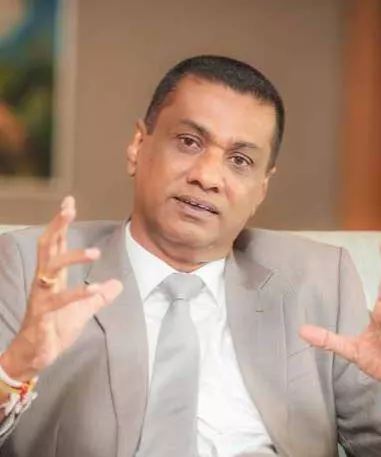
What has the response been so far?
The response has been excellent. As we opened during the COVID-19 pandemic, we did not expect such a response. But many people are unable to travel overseas at this time. They wish to travel within Sri Lanka and stay in luxury properties. From December 2020 up to April 2021, our performance is satisfactory. Initially, Hilton wanted a three months working capital. But we refused, and they agreed to one month’s working capital. You can see how the progress has been because the hotel managed the rest of the expenses.
You didn’t stop but continued through the challenges?
We were able to continue because of our tea business. It was a blessing. Even though the entire country was on lockdown, the Government gave special permission for the tea industry to work. We were able to bring the tea leaves and do the processing. That was the turning point. We continued with the business, and the people were with us. When they announced the lockdown for the entire country last year, we had some foreign employees working for us at the hotel site and could not move out of the country. I spoke to the relevant authorities, and they permitted us. Even the contractor was willing to work in-house, and we had to create a bubble with all the COVID-19 health regulations we managed to keep employees inside the premises. I have to thank Hotel General Manager, Krishantha Damunupola; he was with us for three and a half years. He took the challenge and the initiative and said that he would stay with them and ensure that the work continues. And, also my son Deelaka. Both together, they were excellent support and the Group CEO, Dr. Susantha Pinto, as well. That was a turning point.
From March 2020, we focused entirely on the hotel pre-opening, and we achieved our target on November 24, 2020.
Silver ray has been an iconic stopover when traveling via ratnapura. What was the thinking behind this restaurant?
Silver Ray is located in Lellopitiya in the Ratnapura district. People who travel to Ella, Udawalawe, and Nuwara Eliya pass through this location, and many visit the famous Saman Devalaya in Ratnapura as well. Silver Ray is a known place by everyone. If anyone travels on that route, Silver Ray is the place they stop to relax and refresh. I built Silver Ray because my children would be unhappy whenever they came home to Ratnapura from Colombo, saying no place to hang out. Then, I thought there has to be a place for families to go out and enjoy themselves. We provide clean washroom facilities and good refreshments that we serve at a reasonable price. We maintained high standards from the very beginning.
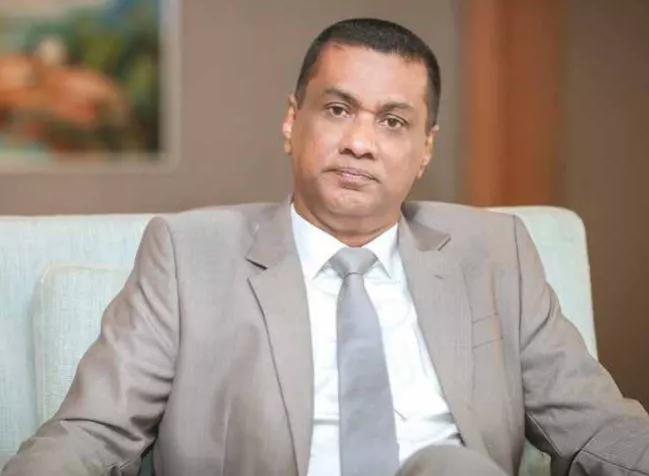
We have a Grand Piano at Silver Ray. It requires space, and generally, we would keep a Grand Piano in a hotel lobby. But in a restaurant, it is a challenging task to do so. It takes the space of about eight to ten covers. When people are traveling and stop for refreshments, they do not want to listen to loud music. We wanted to provide them with subtle oriental music. Sometimes I have seen young girls and boys listen to music and sing songs. They want to play the piano. We have to cater to the requirements of the clients. That is why everyone remembers Silver Ray. If you see the food spread, it is apparent that we have not considered the cost. It is impossible to serve fresh juice with meat/seafood items with rice, noodles, or pasta for 500-600 rupees. But we must have a long-term objective. If you serve good food at your restaurant, then your banquet facilities will automatically be full. It gives you a good reputation.
We aim to offer a 1,000 seating banquet known as Grand Silver Ray, and it will be coming up in September 2021. That will be the only hall in without any pillars having the capacity to accommodate 1,000 seating.
How do you manage everything?
If you are a person who is concerned about the time and works according to a schedule, it is possible. If you are enjoying your business or job, you do not feel the time pass. I can do more work during the day.
Do you feel confident with the challenging period?
Globally, it is a challenge for everyone. With the resources we have, Sri Lanka is a lucrative location with many opportunities. We have that confidence. I was born in Ratnapura, but I have built mini-hydropower plants, hotels, and tea factories. We have been able to maintain the name as the largest orthodox black tea manufacturer in Sri Lanka. This country is an asset and a gem.


